IoT Challenges in Smart Cities: Security, Privacy, and Ethical Issues
VerifiedAdded on 2023/06/08
|6
|1187
|65
Report
AI Summary
This report examines the challenges and issues associated with the widespread implementation of the Internet of Things (IoT) in smart cities. It highlights the dual nature of IoT, acknowledging both its benefits and drawbacks across networking, sensing, analysis, and control modules. Key challenges discussed include privacy and security vulnerabilities, network heterogeneity, and the risks associated with open-source networks. The report also addresses problems such as cybercrime, unstructured data storage, and ethical concerns like data hacking and misuse of personal information. It concludes by emphasizing the importance of risk mitigation strategies and user awareness to enhance the efficiency and overall performance of IoT-enabled systems in smart cities. Desklib provides access to similar solved assignments and study tools for students.
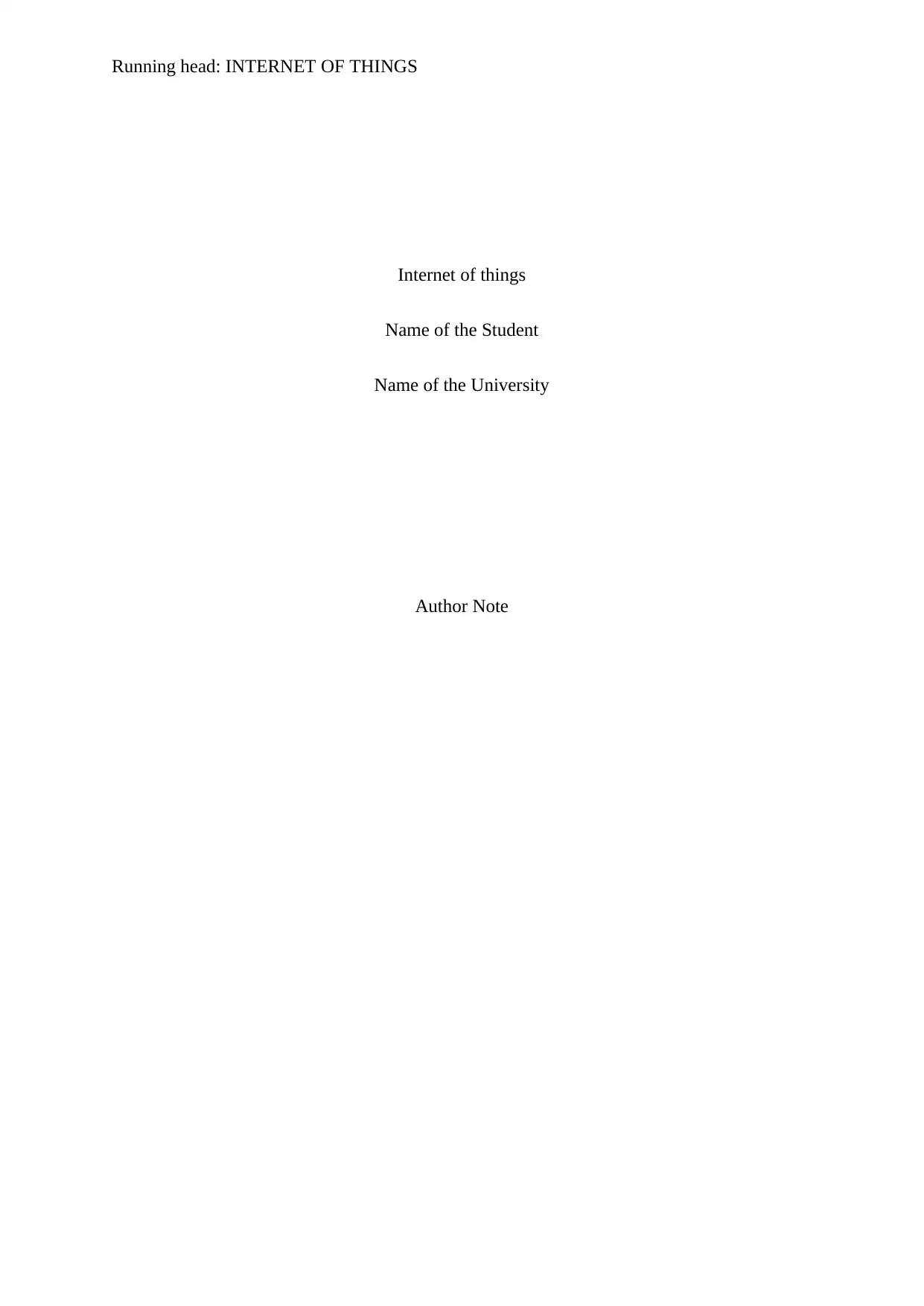
Running head: INTERNET OF THINGS
Internet of things
Name of the Student
Name of the University
Author Note
Internet of things
Name of the Student
Name of the University
Author Note
Paraphrase This Document
Need a fresh take? Get an instant paraphrase of this document with our AI Paraphraser
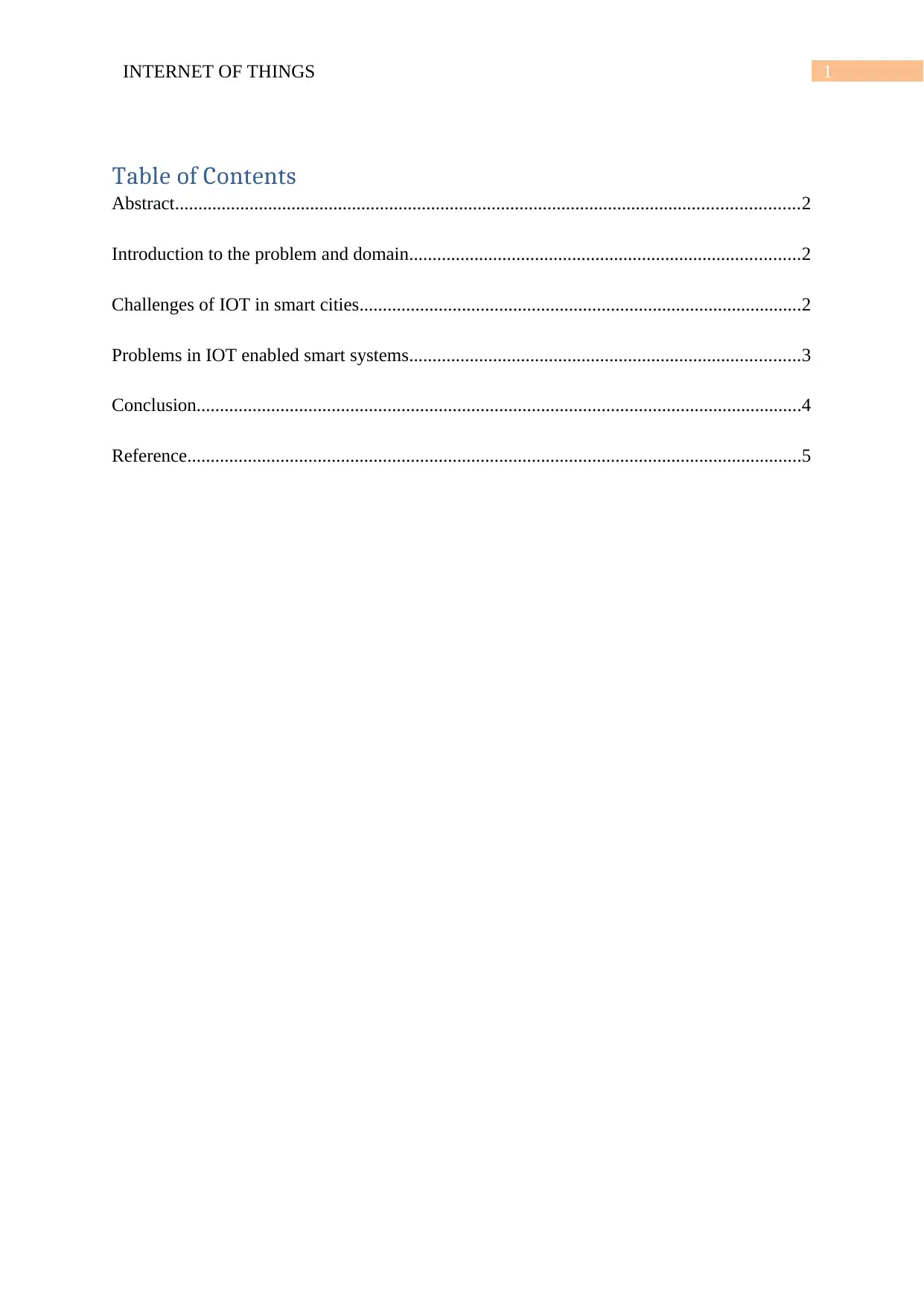
1INTERNET OF THINGS
Table of Contents
Abstract......................................................................................................................................2
Introduction to the problem and domain....................................................................................2
Challenges of IOT in smart cities...............................................................................................2
Problems in IOT enabled smart systems....................................................................................3
Conclusion..................................................................................................................................4
Reference....................................................................................................................................5
Table of Contents
Abstract......................................................................................................................................2
Introduction to the problem and domain....................................................................................2
Challenges of IOT in smart cities...............................................................................................2
Problems in IOT enabled smart systems....................................................................................3
Conclusion..................................................................................................................................4
Reference....................................................................................................................................5
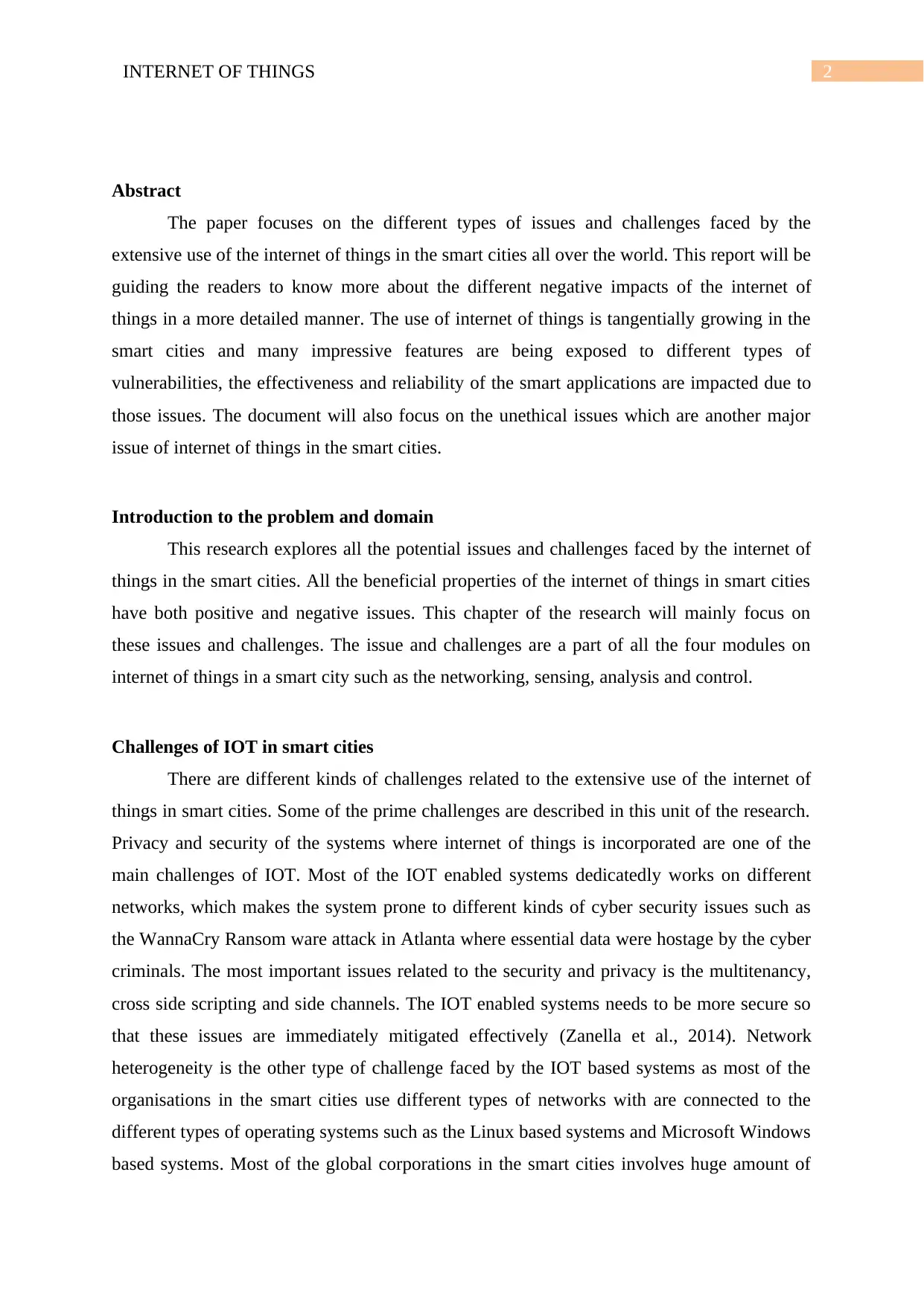
2INTERNET OF THINGS
Abstract
The paper focuses on the different types of issues and challenges faced by the
extensive use of the internet of things in the smart cities all over the world. This report will be
guiding the readers to know more about the different negative impacts of the internet of
things in a more detailed manner. The use of internet of things is tangentially growing in the
smart cities and many impressive features are being exposed to different types of
vulnerabilities, the effectiveness and reliability of the smart applications are impacted due to
those issues. The document will also focus on the unethical issues which are another major
issue of internet of things in the smart cities.
Introduction to the problem and domain
This research explores all the potential issues and challenges faced by the internet of
things in the smart cities. All the beneficial properties of the internet of things in smart cities
have both positive and negative issues. This chapter of the research will mainly focus on
these issues and challenges. The issue and challenges are a part of all the four modules on
internet of things in a smart city such as the networking, sensing, analysis and control.
Challenges of IOT in smart cities
There are different kinds of challenges related to the extensive use of the internet of
things in smart cities. Some of the prime challenges are described in this unit of the research.
Privacy and security of the systems where internet of things is incorporated are one of the
main challenges of IOT. Most of the IOT enabled systems dedicatedly works on different
networks, which makes the system prone to different kinds of cyber security issues such as
the WannaCry Ransom ware attack in Atlanta where essential data were hostage by the cyber
criminals. The most important issues related to the security and privacy is the multitenancy,
cross side scripting and side channels. The IOT enabled systems needs to be more secure so
that these issues are immediately mitigated effectively (Zanella et al., 2014). Network
heterogeneity is the other type of challenge faced by the IOT based systems as most of the
organisations in the smart cities use different types of networks with are connected to the
different types of operating systems such as the Linux based systems and Microsoft Windows
based systems. Most of the global corporations in the smart cities involves huge amount of
Abstract
The paper focuses on the different types of issues and challenges faced by the
extensive use of the internet of things in the smart cities all over the world. This report will be
guiding the readers to know more about the different negative impacts of the internet of
things in a more detailed manner. The use of internet of things is tangentially growing in the
smart cities and many impressive features are being exposed to different types of
vulnerabilities, the effectiveness and reliability of the smart applications are impacted due to
those issues. The document will also focus on the unethical issues which are another major
issue of internet of things in the smart cities.
Introduction to the problem and domain
This research explores all the potential issues and challenges faced by the internet of
things in the smart cities. All the beneficial properties of the internet of things in smart cities
have both positive and negative issues. This chapter of the research will mainly focus on
these issues and challenges. The issue and challenges are a part of all the four modules on
internet of things in a smart city such as the networking, sensing, analysis and control.
Challenges of IOT in smart cities
There are different kinds of challenges related to the extensive use of the internet of
things in smart cities. Some of the prime challenges are described in this unit of the research.
Privacy and security of the systems where internet of things is incorporated are one of the
main challenges of IOT. Most of the IOT enabled systems dedicatedly works on different
networks, which makes the system prone to different kinds of cyber security issues such as
the WannaCry Ransom ware attack in Atlanta where essential data were hostage by the cyber
criminals. The most important issues related to the security and privacy is the multitenancy,
cross side scripting and side channels. The IOT enabled systems needs to be more secure so
that these issues are immediately mitigated effectively (Zanella et al., 2014). Network
heterogeneity is the other type of challenge faced by the IOT based systems as most of the
organisations in the smart cities use different types of networks with are connected to the
different types of operating systems such as the Linux based systems and Microsoft Windows
based systems. Most of the global corporations in the smart cities involves huge amount of
⊘ This is a preview!⊘
Do you want full access?
Subscribe today to unlock all pages.

Trusted by 1+ million students worldwide
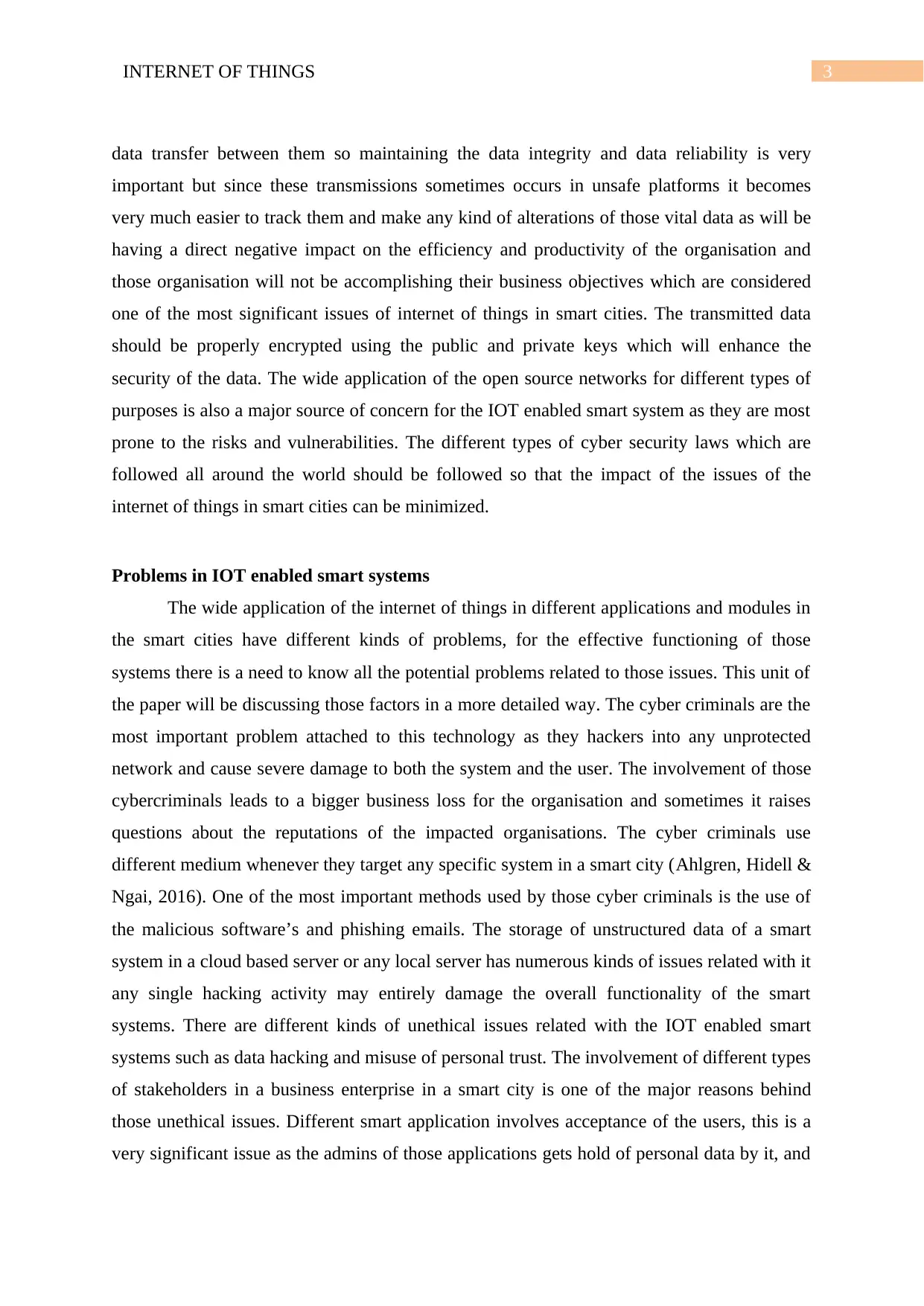
3INTERNET OF THINGS
data transfer between them so maintaining the data integrity and data reliability is very
important but since these transmissions sometimes occurs in unsafe platforms it becomes
very much easier to track them and make any kind of alterations of those vital data as will be
having a direct negative impact on the efficiency and productivity of the organisation and
those organisation will not be accomplishing their business objectives which are considered
one of the most significant issues of internet of things in smart cities. The transmitted data
should be properly encrypted using the public and private keys which will enhance the
security of the data. The wide application of the open source networks for different types of
purposes is also a major source of concern for the IOT enabled smart system as they are most
prone to the risks and vulnerabilities. The different types of cyber security laws which are
followed all around the world should be followed so that the impact of the issues of the
internet of things in smart cities can be minimized.
Problems in IOT enabled smart systems
The wide application of the internet of things in different applications and modules in
the smart cities have different kinds of problems, for the effective functioning of those
systems there is a need to know all the potential problems related to those issues. This unit of
the paper will be discussing those factors in a more detailed way. The cyber criminals are the
most important problem attached to this technology as they hackers into any unprotected
network and cause severe damage to both the system and the user. The involvement of those
cybercriminals leads to a bigger business loss for the organisation and sometimes it raises
questions about the reputations of the impacted organisations. The cyber criminals use
different medium whenever they target any specific system in a smart city (Ahlgren, Hidell &
Ngai, 2016). One of the most important methods used by those cyber criminals is the use of
the malicious software’s and phishing emails. The storage of unstructured data of a smart
system in a cloud based server or any local server has numerous kinds of issues related with it
any single hacking activity may entirely damage the overall functionality of the smart
systems. There are different kinds of unethical issues related with the IOT enabled smart
systems such as data hacking and misuse of personal trust. The involvement of different types
of stakeholders in a business enterprise in a smart city is one of the major reasons behind
those unethical issues. Different smart application involves acceptance of the users, this is a
very significant issue as the admins of those applications gets hold of personal data by it, and
data transfer between them so maintaining the data integrity and data reliability is very
important but since these transmissions sometimes occurs in unsafe platforms it becomes
very much easier to track them and make any kind of alterations of those vital data as will be
having a direct negative impact on the efficiency and productivity of the organisation and
those organisation will not be accomplishing their business objectives which are considered
one of the most significant issues of internet of things in smart cities. The transmitted data
should be properly encrypted using the public and private keys which will enhance the
security of the data. The wide application of the open source networks for different types of
purposes is also a major source of concern for the IOT enabled smart system as they are most
prone to the risks and vulnerabilities. The different types of cyber security laws which are
followed all around the world should be followed so that the impact of the issues of the
internet of things in smart cities can be minimized.
Problems in IOT enabled smart systems
The wide application of the internet of things in different applications and modules in
the smart cities have different kinds of problems, for the effective functioning of those
systems there is a need to know all the potential problems related to those issues. This unit of
the paper will be discussing those factors in a more detailed way. The cyber criminals are the
most important problem attached to this technology as they hackers into any unprotected
network and cause severe damage to both the system and the user. The involvement of those
cybercriminals leads to a bigger business loss for the organisation and sometimes it raises
questions about the reputations of the impacted organisations. The cyber criminals use
different medium whenever they target any specific system in a smart city (Ahlgren, Hidell &
Ngai, 2016). One of the most important methods used by those cyber criminals is the use of
the malicious software’s and phishing emails. The storage of unstructured data of a smart
system in a cloud based server or any local server has numerous kinds of issues related with it
any single hacking activity may entirely damage the overall functionality of the smart
systems. There are different kinds of unethical issues related with the IOT enabled smart
systems such as data hacking and misuse of personal trust. The involvement of different types
of stakeholders in a business enterprise in a smart city is one of the major reasons behind
those unethical issues. Different smart application involves acceptance of the users, this is a
very significant issue as the admins of those applications gets hold of personal data by it, and
Paraphrase This Document
Need a fresh take? Get an instant paraphrase of this document with our AI Paraphraser
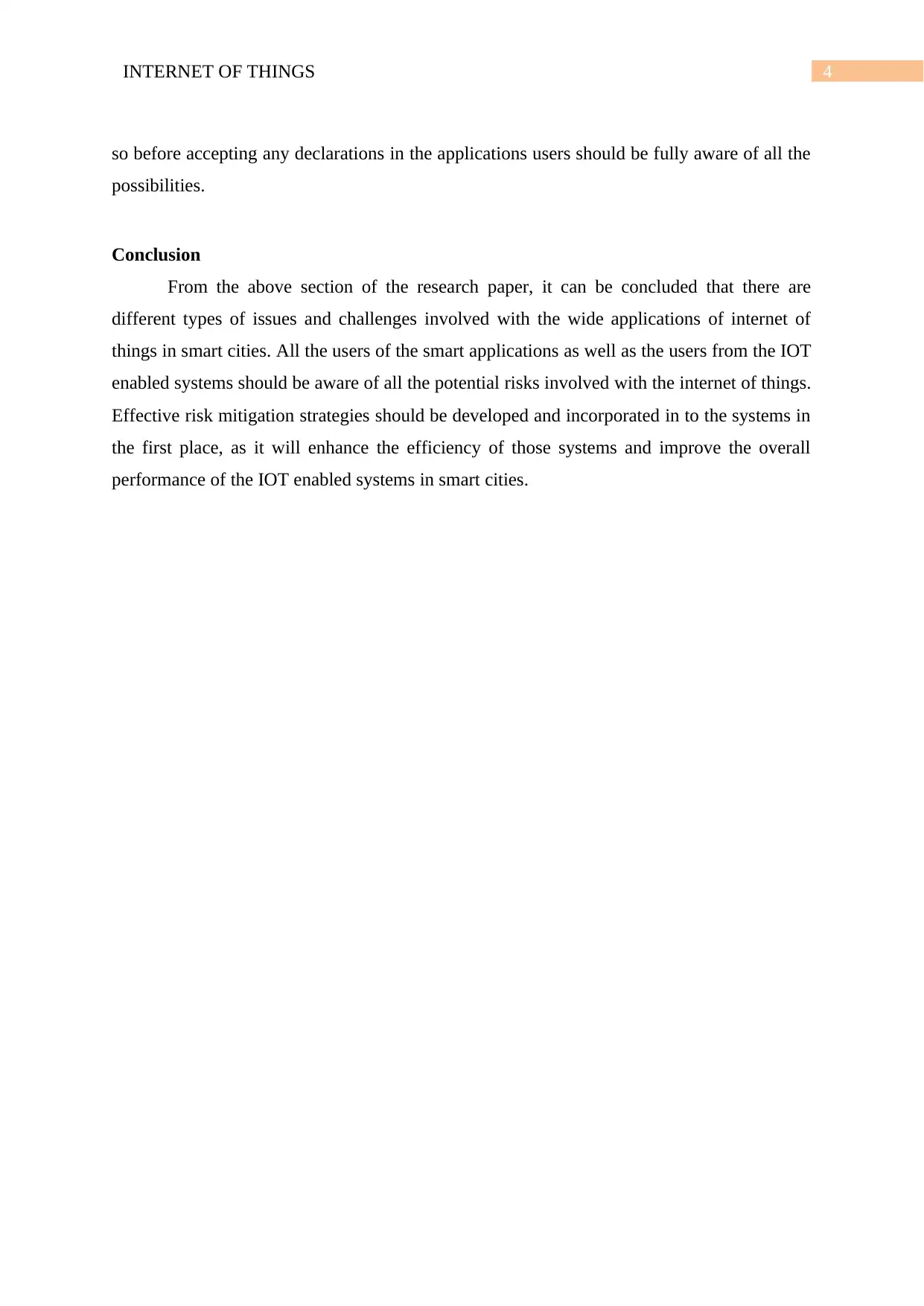
4INTERNET OF THINGS
so before accepting any declarations in the applications users should be fully aware of all the
possibilities.
Conclusion
From the above section of the research paper, it can be concluded that there are
different types of issues and challenges involved with the wide applications of internet of
things in smart cities. All the users of the smart applications as well as the users from the IOT
enabled systems should be aware of all the potential risks involved with the internet of things.
Effective risk mitigation strategies should be developed and incorporated in to the systems in
the first place, as it will enhance the efficiency of those systems and improve the overall
performance of the IOT enabled systems in smart cities.
so before accepting any declarations in the applications users should be fully aware of all the
possibilities.
Conclusion
From the above section of the research paper, it can be concluded that there are
different types of issues and challenges involved with the wide applications of internet of
things in smart cities. All the users of the smart applications as well as the users from the IOT
enabled systems should be aware of all the potential risks involved with the internet of things.
Effective risk mitigation strategies should be developed and incorporated in to the systems in
the first place, as it will enhance the efficiency of those systems and improve the overall
performance of the IOT enabled systems in smart cities.
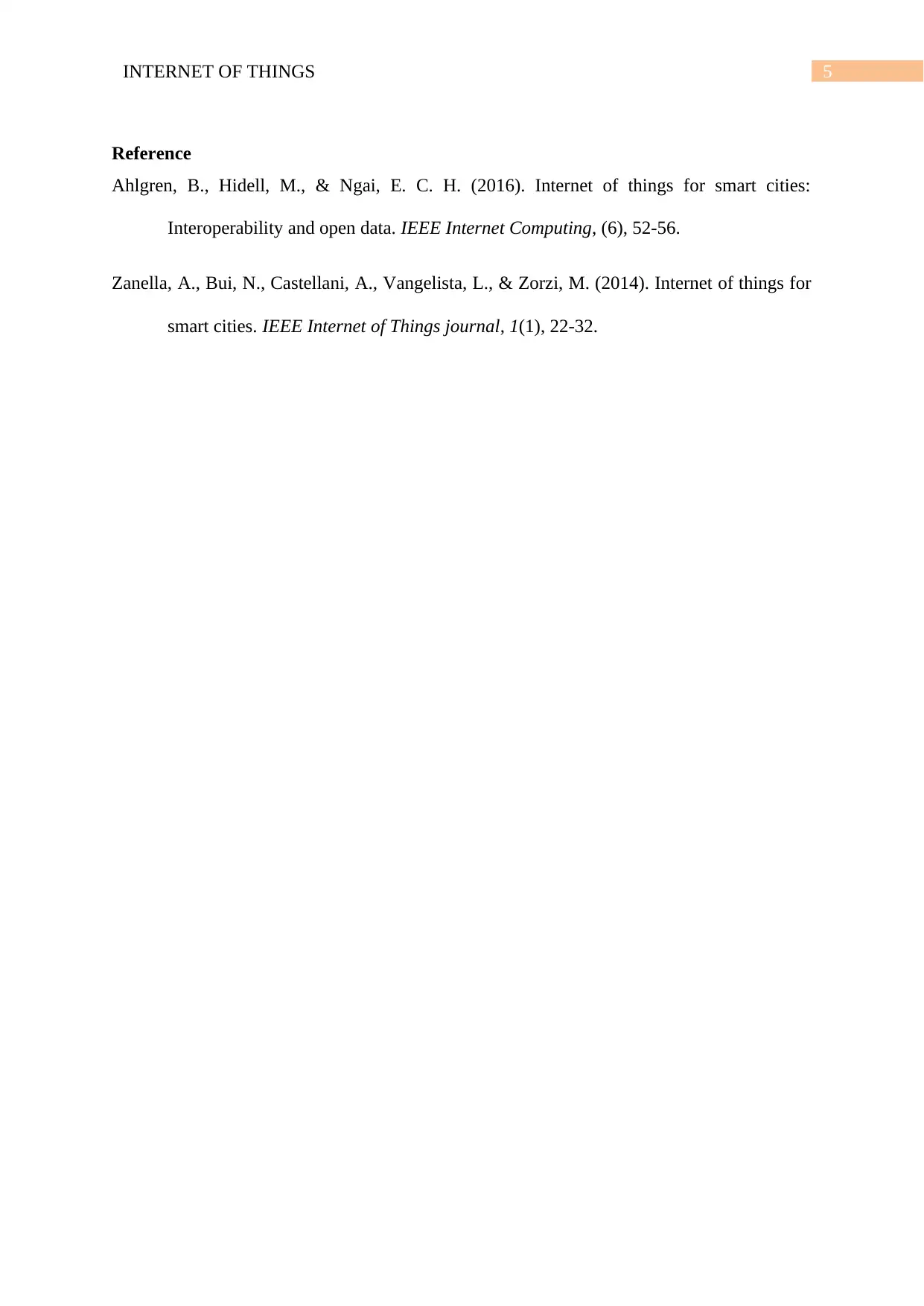
5INTERNET OF THINGS
Reference
Ahlgren, B., Hidell, M., & Ngai, E. C. H. (2016). Internet of things for smart cities:
Interoperability and open data. IEEE Internet Computing, (6), 52-56.
Zanella, A., Bui, N., Castellani, A., Vangelista, L., & Zorzi, M. (2014). Internet of things for
smart cities. IEEE Internet of Things journal, 1(1), 22-32.
Reference
Ahlgren, B., Hidell, M., & Ngai, E. C. H. (2016). Internet of things for smart cities:
Interoperability and open data. IEEE Internet Computing, (6), 52-56.
Zanella, A., Bui, N., Castellani, A., Vangelista, L., & Zorzi, M. (2014). Internet of things for
smart cities. IEEE Internet of Things journal, 1(1), 22-32.
⊘ This is a preview!⊘
Do you want full access?
Subscribe today to unlock all pages.

Trusted by 1+ million students worldwide
1 out of 6
Related Documents
Your All-in-One AI-Powered Toolkit for Academic Success.
+13062052269
info@desklib.com
Available 24*7 on WhatsApp / Email
![[object Object]](/_next/static/media/star-bottom.7253800d.svg)
Unlock your academic potential
Copyright © 2020–2026 A2Z Services. All Rights Reserved. Developed and managed by ZUCOL.




